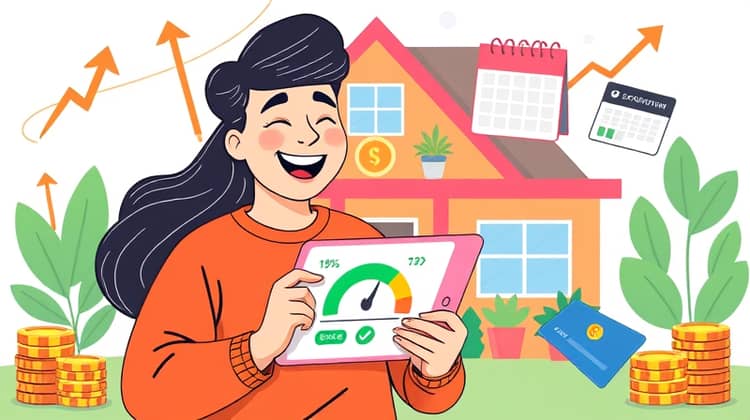Mortgage refinancing can be a beneficial financial decision, particularly when certain conditions align favorably for homeowners. Understanding when to refinance can help you save money, reduce your monthly payments, and achieve long-term stability. Here are five key signs that indicate it may be the right time for you to consider refinancing your mortgage. This guide will provide a clear overview of each sign and how they can contribute to a financially sound decision.
By analyzing interest rates, credit scores, adjustable-rate vs. fixed-rate mortgages, debt consolidation, and home equity options, you will gain insight into the potential advantages of refinancing. It’s essential to evaluate your unique financial situation to determine if refinancing aligns with your long-term goals. Let's explore these indicators in more detail.
1. Lower Interest Rates

One of the most prominent reasons homeowners consider refinancing is the opportunity to secure a lower interest rate. When market rates drop significantly compared to your original mortgage rate, it can greatly impact your overall life savings on interest payments. This reduction in rates can allow you to either lower your monthly payments or pay off your mortgage early.
It’s essential to regularly monitor interest rates, as they can fluctuate due to economic conditions. If you find that current rates are significantly lower than what you’re currently paying, this could indicate it’s time to refinance.
- Interest rates have dropped by at least 1% since you secured your original mortgage.
- Your current interest rate is higher than the current national average.
- You plan to stay in your home for several years, allowing you to fully benefit from lower monthly payments.
Taking advantage of lower interest rates can result in substantial savings. Evaluate how refinancing can restructure your payment plan to align with your financial goals, whether that means reducing monthly obligations or saving for future investments.
However, it’s vital to consider potential closing costs and fees involved in refinancing to ensure the financial benefits outweigh these initial expenses.
2. Improved Credit Score

If you have been actively working on improving your credit score since taking out your mortgage, refinancing could be an excellent option. A higher credit score typically qualifies you for better interest rates and refinancing terms.
Factors such as timely bill payments, reducing credit card debt, and maintaining low credit utilization ratios can significantly boost your credit score, enhancing your refinancing eligibility. This improvement opens up new possibilities for savings.
- Your credit score has increased significantly since you took out your mortgage.
- You have paid off a significant amount of debt, positively impacting your overall credit profile.
- Your credit file shows no new negative marks, such as late payments or defaults, indicating responsible credit use.
With a better credit score, refinancing can bring more favorable terms that could lead to lower monthly payments or even a shorter loan term. It’s essential to check your credit report to ensure accuracy and make necessary corrections before applying.
A solid credit score not only aids in refinancing but may also lead to economic benefits, such as savings on insurance. Ensure your credit remains a top priority for your financial health.
3. Shift from Adjustable-Rate to Fixed-Rate

If you currently have an adjustable-rate mortgage (ARM) and anticipate that interest rates will rise, it may be prudent to refinance to a fixed-rate mortgage. ARMs typically start with lower rates but can increase significantly over time, leading to heightened monthly payments. Transitioning to a fixed-rate mortgage provides stability and predictability in your financial planning.
Refinancing to a fixed-rate mortgage can protect you from potential hikes in interest rates. This fixed rate ensures that your monthly payments remain steady, no matter the economic climate.
- Currently facing rising rates in the market or economy overall.
- Expecting long-term ownership of the home to benefit from stable payments.
- Concerned about budgeting and financial predictability.
Making the switch to a fixed-rate mortgage can lead to better financial management and increased security, particularly in uncertain economic times. If you value predictability in your housing expenses, this shift may be beneficial.
Discuss with your mortgage lender or financial advisor to explore the best options for transitioning from an ARM to a fixed-rate mortgage that suits your needs and goals.
4. Consolidating Debt

Homeowners often consider refinancing to consolidate debt. If you have high-interest debt, such as credit cards or personal loans, refinancing could provide an avenue to access cash for consolidation. With a lower mortgage rate, you can use equity from your home to pay off these debts, leading to potential savings on interest.
Consolidating debt through refinancing can simplify finances by transforming variable high-interest payments into a more manageable mortgage payment, often with a lower interest rate.
- Significant credit card debt is affecting your monthly cash flow.
- Various high-interest loans are complicating your financial situation.
- You're seeking strategies to improve cash flow and reduce interest costs.
Refinancing for debt consolidation can be especially advantageous if it not only serves to reduce interest costs but also minimizes monthly payments, alleviating financial stress. However, it’s essential to assess whether consolidating debt is the right fit for your financial situation.
Always consult a financial advisor before making any significant financial moves to ensure you are making an informed decision based on your current circumstances.
5. Tapping Home Equity

If you are looking to finance a major expense like home renovations, education, or medical bills, refinancing your mortgage to tap into your home equity is a viable option. This allows you to take advantage of your home’s value to secure funds.
Utilizing your home equity through refinancing can offer access to lower interest rates compared to unsecured loans, making it a smart financial decision for significant expenditures.
- Evaluate the current equity in your home to understand how much you can access.
- Determine the purpose of tapping into that equity to ensure it aligns with your financial goals.
- Consider the financial implications and long-term benefits of borrowing against your home.
Exploring home equity as a financial resource can be beneficial, particularly if used for investments that increase your home’s value. However, it’s crucial to use this option wisely to avoid potential risk in the future. Establish clear repayment plans and budget accordingly.
Engaging with a financial expert can help you determine the best approach when refinancing for home equity, ensuring that you choose a strategy that enhances your financial well-being.
Conclusion

Deciding to refinance your mortgage is an important choice that can bring several financial advantages. By recognizing the signs that indicate an optimal time to refinance—such as lower interest rates, an improved credit score, and opportunities for debt consolidation—you can make informed decisions that align with your long-term financial goals.
Ultimately, evaluating your personal financial situation and consulting with professionals in the industry can help you navigate the complexities of refinancing and enable you to make the most of this financial strategy.














